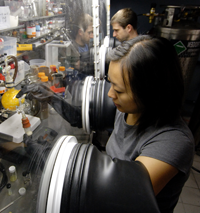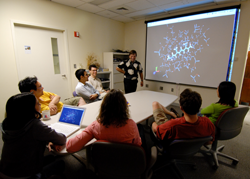PhD Degree

The requirements for a PhD degree involve formal course work, a seminar presentation, special examinations, teaching, and research leading to the PhD thesis. More information about applying for the PhD degree can be found on the graduate admissions page.
Thesis research is the most important aspect of doctoral work. Students generally select a research advisor and begin research during their first year of graduate school. Once admitted as a graduate student in chemistry, a student may choose to work with any faculty member in the Department of Chemistry. The size of the department, combined with the great infrastructure for scientific research that exists at the University of Illinois, guarantees that all incoming students will be able to choose a research project congruent with their goals and interests.
Within the Department of Chemistry there are six areas of study: Analytical, Chemical Biology, Inorganic, Materials, Organic, and Physical.
The well-prepared student can satisfy the formal course requirement within two years (often less) by taking five courses of graduate credit. The selection of these courses is, to a large extent, an individual matter, with the student's research interests and long-range plans as major factors in determining their selection. Courses both within and outside the department can be chosen.
 In addition to the formal courses, students are expected to attend and participate in the departmental seminar program. Participation generally involves presenting a talk on a topic from the chemical literature during the second year of graduate work.
In addition to the formal courses, students are expected to attend and participate in the departmental seminar program. Participation generally involves presenting a talk on a topic from the chemical literature during the second year of graduate work.
The preliminary exam is usually completed in the first semester of the third year and is designed to evaluate the student's research. It involves a written research proposal, a written progress report on the thesis research project, and an oral discussion of a research proposal or the research progress of the student. The final exam, taken when the thesis work is completed, is an oral presentation of the thesis project.
Students in the Department of Chemistry participate in teaching as part of the degree program. The department recognizes that teaching can be an effective experience in learning the fundamentals of a field and in developing communication skills. The duties of teaching assistants generally involve conducting laboratory or discussion sections in various undergraduate courses or working as a grader in more advanced courses. Assignment are made in accord with the student's background and interests whenever possible.
Degree of Doctor of Philosophy in Chemistry - Official catalog page detailing course requirements. Detailed program requirements are found in the department's Graduate Manual.
Certificates
Certificates are not degree programs but are short training programs that give graduate students additional expertise in certain areas. Certificates are issued to students who complete these programs.
Computational Science and Engineering (CSE) option. This option allows our students access to a more systematic training in numerical computation and the use of advanced computer architectures for their research projects. A chemistry graduate student whose PhD thesis has a substantial computational component would receive a CSE Certificate upon completion of the option.
Graduate Concentrations
Astrochemistry Concentration (Not accepting applications at this time). Astrochemistry is an emerging interdisciplinary field at the intersection between chemistry and astronomy. As a few examples, topics of active research in this area include identifying organic molecules in interstellar space, building models of the chemical reactions that occur in interstellar space, laboratory measurements of astronomically important molecules, searching for Earthlike planets using molecular signatures, and understanding the contributions of interstellar molecules to the chemical origin of life. To succeed in this field, students require training in both of the traditional disciplines of chemistry and astronomy, as well as formal (transcript) recognition that they are qualified astrochemists. This graduate concentration provides these benefits. More information can be found on the astrochemistry concentration page. Additional information on all graduate concentrations at Illinois is available at the Graduate College website.
The MS Degree
We also offer a Master's Degree in the Teaching of Chemistry.
Chemistry Graduate Admissions
University of Illinois at Urbana-Champaign
109 Noyes Laboratory, MC-712, Box 57-1
505 South Mathews Avenue
Urbana, IL 61801
Phone: (217) 244-6245
Fax: (217) 244-7091
Email: chem-adm@illinois.edu